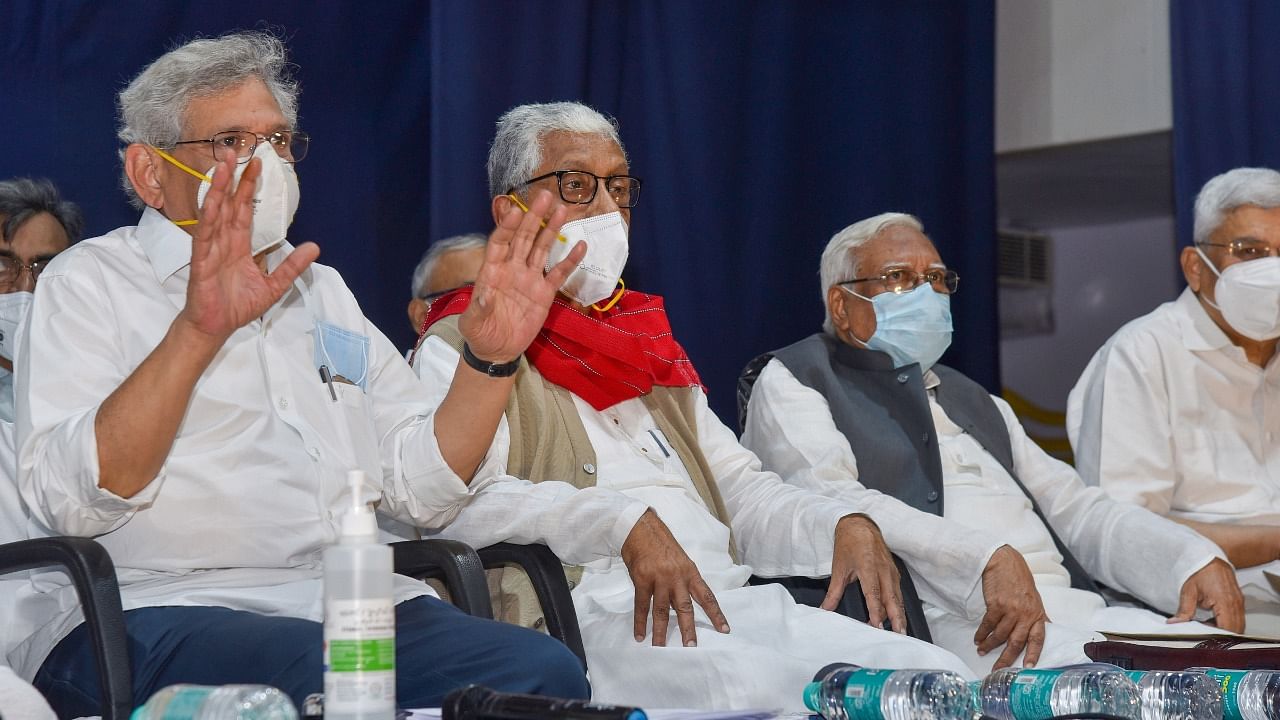
A “weakened Congress” is unable to rally all secular parties but the CPI(M) will cooperate with the Opposition for the “broadest mobilisation” to fight the BJP, the “political arm” of the “fascistic” RSS, and adopt electoral tactics that could maximise the pooling of anti-BJP votes, its draft political resolution stated.
The draft, adopted unanimously by the CPI(M) Central Committee last month and released for comments from cadre and public ahead of the CPI(M) Party Congress in April in Kerala’s Kannur, also underlined that a Left Democratic Programme should be the basis for the fight against the BJP, citing the success of the farmers’ protest and other movements.
CPI(M) General Secretary Sitaram Yechury told a press conference the BJP is äggressively pursuing the Hindutva agenda of the “fascistic RSS” and a “broadest possible mobilisation” is needed to successfully fight their agenda inside and outside Parliament through different means. The draft, he said, highlights that the electoral tactics will be guided by maximum pooling of anti-BJP forces.
According to the draft resolution, the eight years of BJP government has consolidated the “communal-corporate nexus mounting authoritarian attacks” and cited the dissolving of the state of Jammu and Kashmir and abrogation of its special status, passing of Citizenship Amendment Act, starting of Ram temple construction in Ayodhya and the attack on democratic rights and civil liberties through “gross misuse of draconian” laws.
“Functioning as the political arm of the fascistic RSS, the BJP is aggressively seeking to implement the Hindutva agenda. It is feverishly pursuing neo-liberal reforms and strengthening authoritarianism,” it said, adding there is a “systematic effort to undermine” the Constitution and the country’s institutions.
Capping the inner-party differences over identifying the BJP's character, the draft reflects the change in CPI(M)’s understanding and characterises it as fascistic rather than authoritarian. The draft emphasises RSS' "fascistic" nature in stronger terms than the 2018 Party Congress, reflecting Yechury's arguments getting an upper hand in the party.
To fight the BJP, the draft says the strengthening of the CPI(M) and Left forces are required and the party must work for a “broad mobilisation of all secular forces” against the "Hindutva communalism” inside and outside Parliament.
While it emphasises that “a weakened Congress is unable to rally all the secular Opposition parties”, the draft does not completely shut the CPI(M)’s doors and says, “as and when elections take place appropriate electoral tactics to maximise the pooling of anti-BJP votes will be adopted on the above political line.”
At the same time, CPI(M) acknowledges Congress’ “declining” political influence and organisational strength and the crisis in that party following defections to the BJP. It also says that the Congress is “unable to effectively mount an ideological challenge” to Hindutva forces and “often adopts a compromising approach”.
On regional outfits, the draft says the CPI(M) seeks to cooperate with such parties on joint struggles but their political positions in states should be taken into account while working out the tactical approach towards them, a remark seen as one aimed at Trinamool Congress, which is “today aspiring to be the leader of the anti-BJP forces at the national level.”
At the same time, the draft says, the CPI(M) “should not equate” the governments led by secular regional parties with the BJP-led Centre though it may be fighting against its policies. There have been discussions within the party against targeting Mamata Banerjee-led Trinamool Congress by equating it with the BJP.
Watch the latest DH Videos here:
